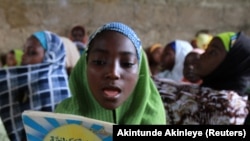A girls’ education rights group, the Malala Fund, says most of Nigeria's out-of-school children during the pandemic are girls, and that the gap with boys is widening.
Joy Pam, 13, has had to wash the plates, cook the family meals, and sweep the compound daily since the pandemic forced schools to shut down in March.
Even though schools have reopened now, she still must continue with her chores at home even though her classmates are back at school.
“When I see them going to school, tears will start dropping out from my eyes. I wish my parents will get the money to pay my school fees so that I can go back to school, because I want to go back to school and study,” she said.
The Malala Fund is a nonprofit education rights group that advocates for girls’ education around the world.
Its Nigerian representative, Crystal Ikanih-Musa, says Nigeria has more girls out of school than boys, especially in the north.
“Before the COVID pandemic, Nigeria had 13.2 million children out of school, over 50% of that number are girls. Once the pandemic hit, way more than that, up to 36 million children were out of school,” she said.
Education officials such as Mathew Sule, the executive chairman of the Plateau State Universal Basic Education Board, say girls face more obstacles in gaining access to education.
“Assistance should be given to the children, particularly the girl child. We have had television and radio broadcasts; we have produced some hard copy material which has been delivered to the children at home,” he said.
Research spearheaded by the Malala Fund’s Ikanih-Musa indicates that during the lockdown many girls faced hurdles to being able to use government-provided distance-learning options.
“Girls that are in rural areas, a lot of them did not have access to television or radio because they don’t have electricity, there are also cultural and social norm factors where these girls are not able to have access to data. So, in a typical family the girl may have to ask a parent or a spouse to use a smart phone where she could have accessed some of this material and depending on if they were granted permission, they were able to access this alternative learning options,” she said.
Girls also spent more time doing household chores during the lockdown, according to Malala Fund Champion and CEO of Connected Development Hamzat Lawal.
“We saw from data collected directly from children, with consent from their parents, a lot of girls got more hours to do house chores while boys got plenty of hours to play. So, what this also means is that girls had less hours to study and prepare for school reopening," said Lawal.
The Universal Basic Education Act of 2004 offers free education for every Nigerian child from primary to junior secondary school. But Hamzat Lawal, the CEO of Connected Development and Malala Fund Champion, says there are hidden fees that many poor families cannot afford.
“Our campaign is saying remove hidden fees, amend the Universal Basic Education Act and ensure compulsory that girls and boys, and particularly girls, go to school to access free 12 years’ education,” said Lawal.
The State Universal Basic Education Board is calling on development partners to help fund education for children in rural communities.




